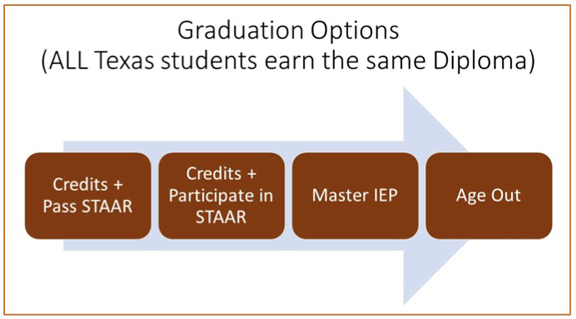en Español • Print • Share

For typical students, there is only one way to graduate and receive a high school diploma. Students must pass all the required courses (with a grade of 70% or higher) and gain enough credits for the Foundation program, with or without endorsement, or the Distinguished Level of Achievement. To graduate, they also must pass the statewide assessment (STAAR: State of Texas Assessments of Academic Readiness).
For students receiving special education services, there are four “options” for graduation and receipt of a diploma. An ARD committee, which includes you and your child, will decide and document in the IEP which option best meets the needs of your child. No matter which option is chosen, all students will receive a summary of academic and functional performance when they graduate and no longer receive services.
The first option is to graduate just like typical students – pass all the required courses and receive credits for the Foundation, Foundation plus Endorsements, or Distinguished Achievement program and pass the required state end of course assessments (STAAR). For this option, there can be NO curriculum modifications (academic goals or objectives).
NOTE: A student who is dismissed from special education services before graduation from high school must perform satisfactorily on any remaining general assessments (i.e., STAAR® or STAAR A) taken after the student is dismissed from special education. ARD committees should have confidence that a student who is dismissed from special education will be able to successfully complete all of the requirements for high school graduation, including satisfactory performance on any remaining end-of-course assessments.
The second option is to graduate similar to the first option (passing all the required courses and receiving credits for the Foundation only program) except that the ARD/IEP Committee determines whether satisfactory performance on the required state assessment (STAAR) shall be required for graduation.
To receive an endorsement - the student's ARD/IEP Committee (which includes the parent):
- will ensure that determine that the curriculum, as modified, is sufficiently rigorous enough, AND
- whether the student is required to achieve satisfactory performance on an end of course assessment (TEC 28.025 (c-7)).
With these first two options, students receive the majority of their instruction in general education and a diploma. Any special education or related services will end with the receipt of the diploma.
Students cannot come back for services after participating in graduation or receiving the diploma under the first two options.
The third option is for the student to graduate by:
- Successfully completing the state's or district's (whichever is greater) required standards through courses, one or more of which contain modified content that is aligned to the standards required under the foundation program, as well as the credit requirements under the foundation program;
- Participation in required state assessments (STAAR): The ARD committee determines whether satisfactory performance on the required state assessments (STAAR) is necessary for graduation;
- Completing the student's Individualized Education Program (IEP); and
- Meeting one of the following conditions, consistent with the IEP:
(A) full-time employment, based on the student's abilities and local employment opportunities, in addition to sufficient self-help skills to enable the student to maintain the employment without direct and ongoing educational support of the local school district;
(B) demonstrated mastery of specific employability skills and self-help skills which do not require direct ongoing educational support of the local school district; or
(C) access to services which are not within the legal responsibility of public education or employment or educational options for which the student has been prepared by the academic program.
For more information on these three choices – See Graduate By IEP.
If a student graduates with this option, the school district must conduct an evaluation and include it as part of the Summary of Academic and Functional Performance. NOTE: If a student is only participating in graduation ceremonies, the school doesn’t need to complete an evaluation until they officially graduate.
In addition, if the student receives a diploma and leaves school under this option, but has not reached the age eligibility limits (turn 22 years old after Sept. 1), the student (or parent) can request to resume special education services. The ARD committee shall determine needed educational services by reviewing existing data. A Full and Individual Evaluation (FIE) is not required. The ARD Committee would determine the services to be provided and the student could then return to school for additional services after graduation if the student still meets the age eligibility requirements.
For more information on this option – See Graduate By IEP.
The fourth option is for the student to receive a diploma and graduate when the ARD committee determines that the student no longer meets age eligibility requirements and has completed the requirements specified in the IEP. No evaluation is required if a student ages out of the system.
Graduation under this option is not automatic and should be based on the student’s need for further special education services, not just their age. While parents sometimes automatically assume their children will stay until 21, they really need to think about what their student wants, the student’s individual need for special education, and the student’s ability to reach his or her transition goals.
Texas Education Agency resources:
Certificate of High School Equivalency
Online College and Career Readiness Resource Center
Graduation in Texas: Options for Students with Disabilities (Region 13 ESC)
Legal Framework for the Child Centered Process - Graduation
Texas Project FIRST resources:
Summary of Performance
Other resources:
